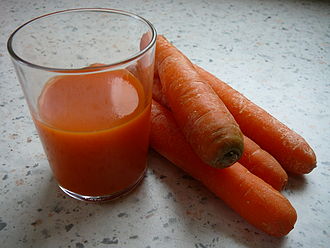Vegetable juice
Vegetable Juice[edit]

Vegetable juice is a beverage made from the extraction or pressing of the natural liquid contained in vegetables. It can also refer to liquids that are flavored with vegetable juice concentrates or powders. Vegetable juice is often consumed for its health benefits, as it is rich in vitamins, minerals, and antioxidants.
Preparation[edit]
Vegetable juice can be prepared using a variety of methods, including blending, juicing, or pressing. The choice of method often depends on the desired texture and nutritional content. Common vegetables used in vegetable juices include carrots, celery, beets, tomatoes, and spinach.
Blending[edit]
Blending involves mixing whole vegetables in a blender until a smooth consistency is achieved. This method retains the fiber content of the vegetables, which is beneficial for digestion.
Juicing[edit]
Juicing extracts the liquid from vegetables, leaving behind the pulp. This method results in a smoother texture and allows for the consumption of a larger quantity of vegetables in a single serving.
Pressing[edit]
Pressing involves using a hydraulic press to extract juice from vegetables. This method is often used in commercial juice production and is known for preserving the nutritional content of the vegetables.
Health Benefits[edit]
Vegetable juice is a rich source of essential nutrients, including vitamins A, C, and K, as well as minerals such as potassium and magnesium. It is also high in antioxidants, which help protect the body from oxidative stress and reduce the risk of chronic diseases.
Weight Management[edit]
Consuming vegetable juice can aid in weight management by providing a low-calorie, nutrient-dense option that can help reduce overall calorie intake.
Digestive Health[edit]
The fiber content in blended vegetable juices supports healthy digestion and can help prevent constipation.
Immune Support[edit]
The vitamins and antioxidants in vegetable juice can boost the immune system, helping the body fight off infections and illnesses.
Common Types of Vegetable Juice[edit]

Carrot Juice[edit]
Carrot juice is one of the most popular types of vegetable juice. It is rich in beta-carotene, which the body converts into vitamin A, essential for healthy vision and skin.
Beet Juice[edit]
Beet juice is known for its vibrant color and earthy flavor. It is high in nitrates, which can improve blood flow and lower blood pressure.
Tomato Juice[edit]
Tomato juice is often consumed as a base for cocktails such as the Bloody Mary. It is high in lycopene, an antioxidant linked to reduced risk of heart disease and cancer.
Related Pages[edit]
Ad. Transform your life with W8MD's Budget GLP-1 injections from $75


W8MD offers a medical weight loss program to lose weight in Philadelphia. Our physician-supervised medical weight loss provides:
- Weight loss injections in NYC (generic and brand names):
- Zepbound / Mounjaro, Wegovy / Ozempic, Saxenda
- Most insurances accepted or discounted self-pay rates. We will obtain insurance prior authorizations if needed.
- Generic GLP1 weight loss injections from $75 for the starting dose.
- Also offer prescription weight loss medications including Phentermine, Qsymia, Diethylpropion, Contrave etc.
NYC weight loss doctor appointmentsNYC weight loss doctor appointments
Start your NYC weight loss journey today at our NYC medical weight loss and Philadelphia medical weight loss clinics.
- Call 718-946-5500 to lose weight in NYC or for medical weight loss in Philadelphia 215-676-2334.
- Tags:NYC medical weight loss, Philadelphia lose weight Zepbound NYC, Budget GLP1 weight loss injections, Wegovy Philadelphia, Wegovy NYC, Philadelphia medical weight loss, Brookly weight loss and Wegovy NYC
|
WikiMD's Wellness Encyclopedia |
| Let Food Be Thy Medicine Medicine Thy Food - Hippocrates |
Medical Disclaimer: WikiMD is not a substitute for professional medical advice. The information on WikiMD is provided as an information resource only, may be incorrect, outdated or misleading, and is not to be used or relied on for any diagnostic or treatment purposes. Please consult your health care provider before making any healthcare decisions or for guidance about a specific medical condition. WikiMD expressly disclaims responsibility, and shall have no liability, for any damages, loss, injury, or liability whatsoever suffered as a result of your reliance on the information contained in this site. By visiting this site you agree to the foregoing terms and conditions, which may from time to time be changed or supplemented by WikiMD. If you do not agree to the foregoing terms and conditions, you should not enter or use this site. See full disclaimer.
Credits:Most images are courtesy of Wikimedia commons, and templates, categories Wikipedia, licensed under CC BY SA or similar.
Translate this page: - East Asian
中文,
日本,
한국어,
South Asian
हिन्दी,
தமிழ்,
తెలుగు,
Urdu,
ಕನ್ನಡ,
Southeast Asian
Indonesian,
Vietnamese,
Thai,
မြန်မာဘာသာ,
বাংলা
European
español,
Deutsch,
français,
Greek,
português do Brasil,
polski,
română,
русский,
Nederlands,
norsk,
svenska,
suomi,
Italian
Middle Eastern & African
عربى,
Turkish,
Persian,
Hebrew,
Afrikaans,
isiZulu,
Kiswahili,
Other
Bulgarian,
Hungarian,
Czech,
Swedish,
മലയാളം,
मराठी,
ਪੰਜਾਬੀ,
ગુજરાતી,
Portuguese,
Ukrainian